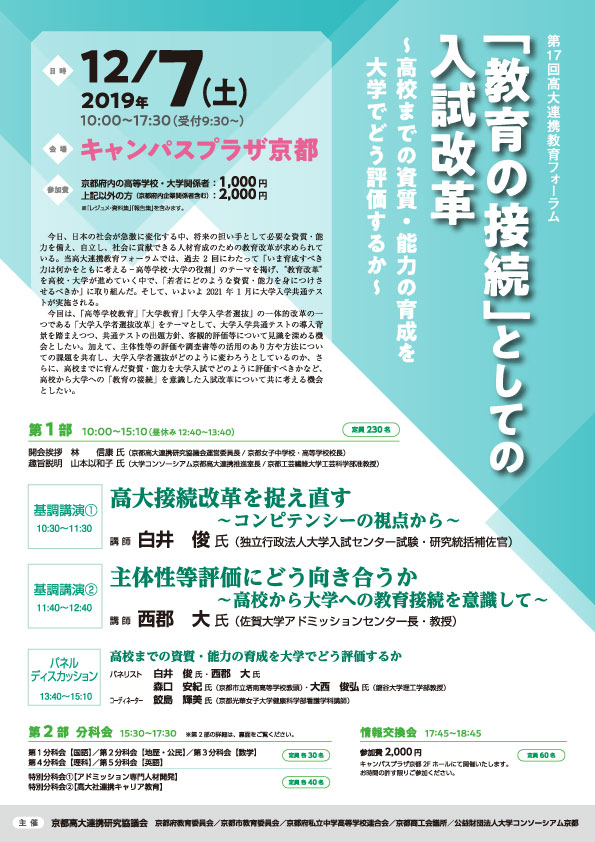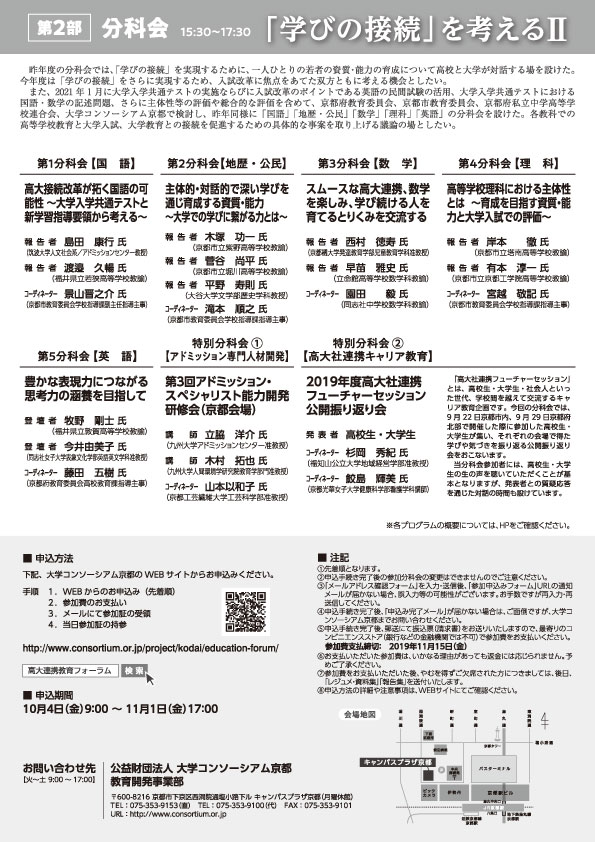Business overview
The forum is being held with the aim of “sharing information on domestic trends and disseminating information on efforts being made in Kyoto” regarding issues of collaboration and connectivity in education between high schools and universities.
Event Outline
The 17th High School-University Collaboration Education Forum
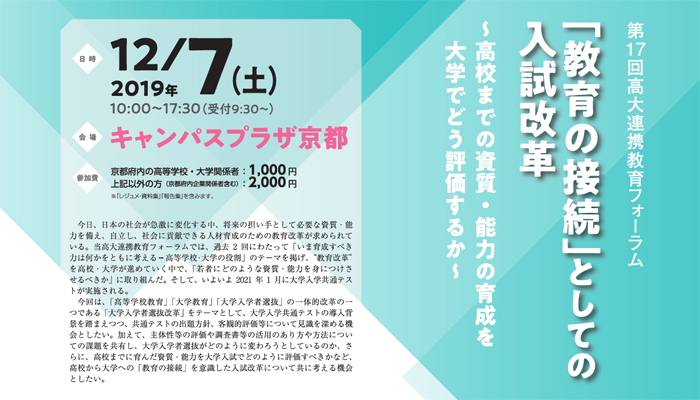
| schedule | Saturday, December 7, 2019 | ||
| venue | Campus Plaza Kyoto | ||
| theme | Entrance examination reform as a “connection to education” – How should universities evaluate the qualities and abilities developed up to high school? |
||
| Capacity | Part 1 | Keynote speech 1, Keynote speech 2, Panel discussion | 230 people (first come first served) |
| Part 2 | Session 1: Japanese | 60 people (first come first served) *Increased capacity | |
| Session 2: Geography, History and Civics | 50 people (first come first served) *Increased capacity | ||
| Subcommittee 3 “Mathematics” | 30 people (first come first served) | ||
| Subcommittee 4 “Science” | 30 people (first come first served) | ||
| Subcommittee 5 “English” | 30 people (first come first served) | ||
| Special Session 1: “Development of admissions professionals” | 60 people (first come first served) *Increased capacity | ||
| Special Session 2: “High School-University-Social Collaborative Career Education” | 40 people (first come first served) | ||
| Information exchange meeting | 60 people (first come first served) | ||
| Participation fee |
Part 1 and Part 2 | High school and university personnel in Kyoto Prefecture Anyone other than the above (including corporate participants in Kyoto Prefecture) *This includes “resumes/collection of materials” and “collection of reports.” |
1,000 yen 2,000 yen |
| Information exchange meeting | If you wish to participate in the information exchange session to be held at Campus Plaza Kyoto Hall, please pay the amount shown on the right in advance. | 2,000 yen | |
| Sponsored by | Kyoto High School-University Collaborative Research Council (Kyoto Prefectural Board of Education/Kyoto City Board of Education/Kyoto Prefectural Association of Private Junior and Senior High Schools/Kyoto Chamber of Commerce and Industry/University Consortium Kyoto, a public interest incorporated foundation) | ||
The flyer for the 17th High School-University Collaboration Education Forum can be downloaded here.
[Part 1] 10:00-15:10 Keynote speech 1, Keynote speech 2, Panel discussion
Opening remarks:
Nobuyasu Hayashi (Chairman of the Kyoto High School-University Collaboration Research Council Steering Committee / Principal of Kyoto Women’s Junior and Senior High School)
Purpose explanation:
Iwako Yamamoto (Director of the University Consortium Kyoto High School-University Collaboration Promotion Office / Associate Professor, Faculty of Engineering Science, Kyoto Institute of Technology)
| Keynote speech ① 10:30-11:30 |
Rethinking High School-University Transition Reforms : From a Competency Perspective
|
| The main focus of the current high school-university transition reform is to link high school education reform, university entrance examination reform, and university education reform, but the underlying concept of these is the concept of competency. In the keynote speech, I would like to consider the goals of the new curriculum guidelines and university entrance examination reform, based on the discussion of competency. | |
| 11:30~11:40 | break |
| Keynote speech ② 11:40-12:40 |
How to deal with evaluations of autonomy, etc .: Keeping in mind the educational continuity from high school to university
|
| It is not easy to evaluate “the attitude of learning with initiative and collaboration with diverse people,” one of the three elements of academic ability, in entrance examinations. However, as this is being promoted as a policy, it is also something that high schools and universities should constructively discuss. In this lecture, I will introduce perspectives and evaluation approaches for capturing the evaluation of initiative, etc., and consider what universities and high schools should do from the perspective of “educational connectivity.” | |
| 12:40~13:40 | Lunch break |
| Panel discussion : 13:40-15:10 |
How should universities evaluate the qualities and abilities students have acquired up to high school?
|
[Part 2] 15:30-17:30 Seminar: Thinking about “Connecting Learning” II
Last year’s subcommittee provided a forum for high schools and universities to discuss the development of the qualities and abilities of each individual young person in order to realize the “learning connection.” This year, in order to further realize the “learning connection,” we would like to use this opportunity for both sides to think about entrance exam reform.
In addition, the Kyoto Prefectural Board of Education, Kyoto City Board of Education, Kyoto Prefectural Private Junior and Senior High School Association, and University Consortium Kyoto have discussed the implementation of the University Entrance Common Test in January 2021, the use of private English exams, which is a key point of the entrance exam reform, the Japanese and mathematics essay questions in the University Entrance Common Test, as well as evaluation of autonomy and comprehensive evaluation, and have set up subcommittees for “Japanese,” “Mathematics,” “Science,” “History and Geography/Civics,” and “English,” just like last year. We would like to use this as a forum for discussion to take up specific issues to promote the connection between high school education in each subject and university entrance exams and university education.
| Session 1 [Japanese] |
Possibilities for Japanese Language Opened Up by High School -University Transition Reforms: Considering the Common University Entrance Examination and New Curriculum Guidelines
|
| In advance of the implementation of the new curriculum guidelines from the 4th year of Reiwa, the new Common University Entrance Examination will begin from the 3rd year of Reiwa (implemented in the 2nd year of Reiwa). With a focus on what kind of abilities Japanese language education should aim to develop in the future, we will consider what can be seen through the high school-university transition reform together with two speakers invited from high schools and universities. | |
| Session 2 [History and Geography/Civics] |
Qualities and abilities developed through proactive, interactive, and in-depth learning : What skills will lead to university learning?
|
| We will report on our practice of improving classes to improve the qualities and abilities needed to live and work by having students use social perspectives and ways of thinking and engage in independent, interactive, and in-depth learning. We will also hear the opinions of university professors about the qualities and abilities that students should acquire through their subjects and that will serve as the foundation for learning at university. Based on this, we would like to discuss improvements to classes that aim to improve the qualities and abilities that support lifelong learning, and university entrance exams that measure this (such as the Common University Entrance Examination). | |
| Subcommittee 3 [Mathematics] |
Share the efforts to foster smooth high school-university collaboration, enjoy mathematics, and develop people who continue to learn.
|
| Let’s share our efforts to smoothly transition from high school to university learning, and our efforts and ideas to nurture people who maintain an interest in mathematics and continue to learn. | |
| Subcommittee 4 [Science] |
Independence in high school science: the qualities and abilities we aim to foster and how they are evaluated in university entrance exams
|
| Based on reports of practical teaching practices from high schools, we will consider how to stimulate intellectual curiosity and develop the ability to learn science in high school science classes. In addition, all participants will discuss how this ability should be evaluated in university entrance examinations and the means to achieve this. | |
| Subcommittee 5 [English] |
Aiming to cultivate thinking skills that lead to rich expressive abilities
|
| The English ability required to be developed under the new curriculum guidelines is not limited to a superficial understanding of English, but is a higher-level ability to think, judge, and express appropriate language materials according to the purpose, scene, and situation in dialogue with a variety of people. In this subcommittee, we will explore specific methods for developing deep thinking and rich expressiveness, consider how to develop higher-level abilities, and exchange opinions with participants. | |
| Special Session 1: [Development of admissions specialists] |
The 3rd Admissions Specialist Skills Development Workshop (Kyoto)
|
| This subcommittee has been in place since 2017, and will continue to hold training sessions aimed at developing highly specialized human resources in the high school-university connection area, targeting university faculty and staff in charge of entrance exams and others who want to acquire specialized knowledge in entrance exams. This time, the topics covered will be “The status of recommendation and AO entrance exams” and “Risk management for entrance exams.” This subcommittee will be held jointly with Kyushu University’s Next Generation University Education Development Center. | |
| Special Session 2 [High School-University-Social Collaborative Career Education] |
2019 High School and University Collaboration Future Session Public Review Meeting
|
| The “High School-University-School Collaboration Future Session” is a career education project that brings together high school students, university students, and working adults across generations and schools. This time, high school and university students who participated in the sessions held in Kyoto City on September 22 and in northern Kyoto Prefecture on September 29 will gather together for an open review session to look back on what they learned and realized at each venue. The aim of this session is for participants to experience the process of thinking and acting by listening to the real voices of high school and university students, and to have an opportunity for dialogue through question and answer sessions. |
Information exchange meeting
| 17:45~18:45 | We will hold an information exchange meeting in the hall of Campus Plaza Kyoto, where the forum will be held. We will provide light snacks and drinks, so we hope you will join us. |
Application
The online application period has ended.
For inquiries regarding participation,
please contact the High School-University Collaboration Education Forum (Email: kodai@consortium.or.jp/TEL: 075-353-9153).
Step 1:
Register your email address using the “Apply” button below.
Step 2:
Access the “Participation Application Form” URL sent to the registered email address, follow the instructions on the screen, enter your details, and receive the “Application Completion Email.”
Step 3 : Pay the participation fee at a convenience store by Friday, November 15, 2019
, using the payment slip/invoice that will be mailed to you. Step 4: Receive the “Participation Certificate” sent to the registered email address. Step 5: On the day of the forum, bring your “Participation Certificate” with you and present it at the reception.
Application period: Friday, October 4, 2019, 9:00am – Friday, November 1, 2019, 5:00pm
*If your browser’s cookies are not enabled, you may not be able to apply.
*Each subcommittee has a limited number of participants, so you cannot change your application after completing the application process.
*We cannot accept applications on the day of the event.
Implementation Report
Report of the 17th High School-University Collaboration Education Forum [Click here for details]
With the Common University Entrance Examination to be held in January 2021, this time, we held the event under the theme of “Entrance Examination Reform as a ‘Connectivity of Education’ – How to Evaluate the Development of Qualifications and Skills in High School at University,” as an opportunity to think together about “reform of university admission selection” with an awareness of “educational connection” from high school to university. 223 people from all over the country, from Hokkaido in the north to Okinawa in the south
, participated. In the first part, keynote speech ①, Mr. Shun Shirai, Research Director of the National Center for University Entrance Examinations, gave a lecture titled “Rethinking the High School-University Connection Reform – From the Perspective of Competency”, and in the second keynote speech ②, Professor Masaru Nishigori, Director of the Admissions Center at Saga University, gave a lecture titled “How to deal with the evaluation of autonomy, etc. – With an awareness of the educational connection from high school to university”.
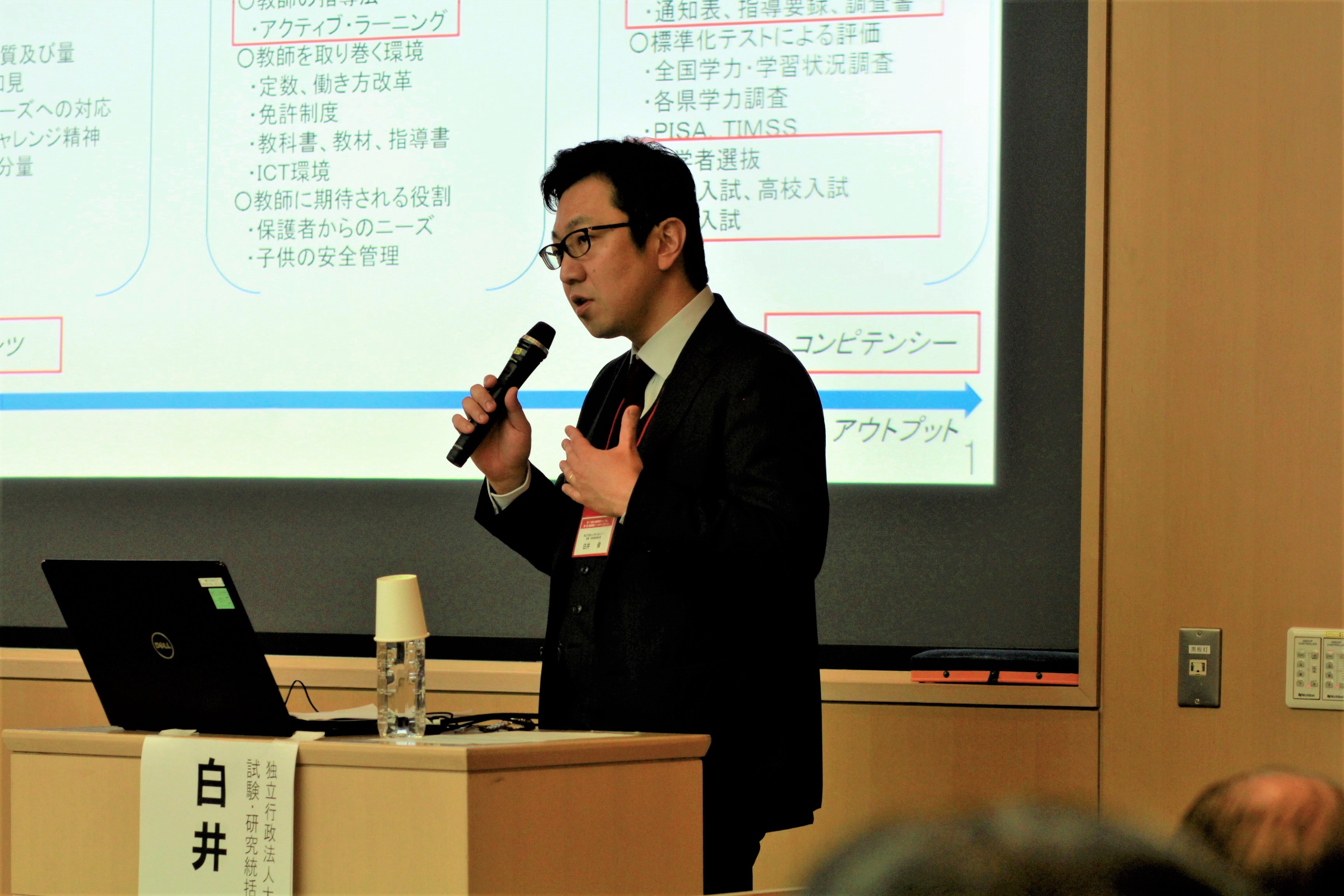
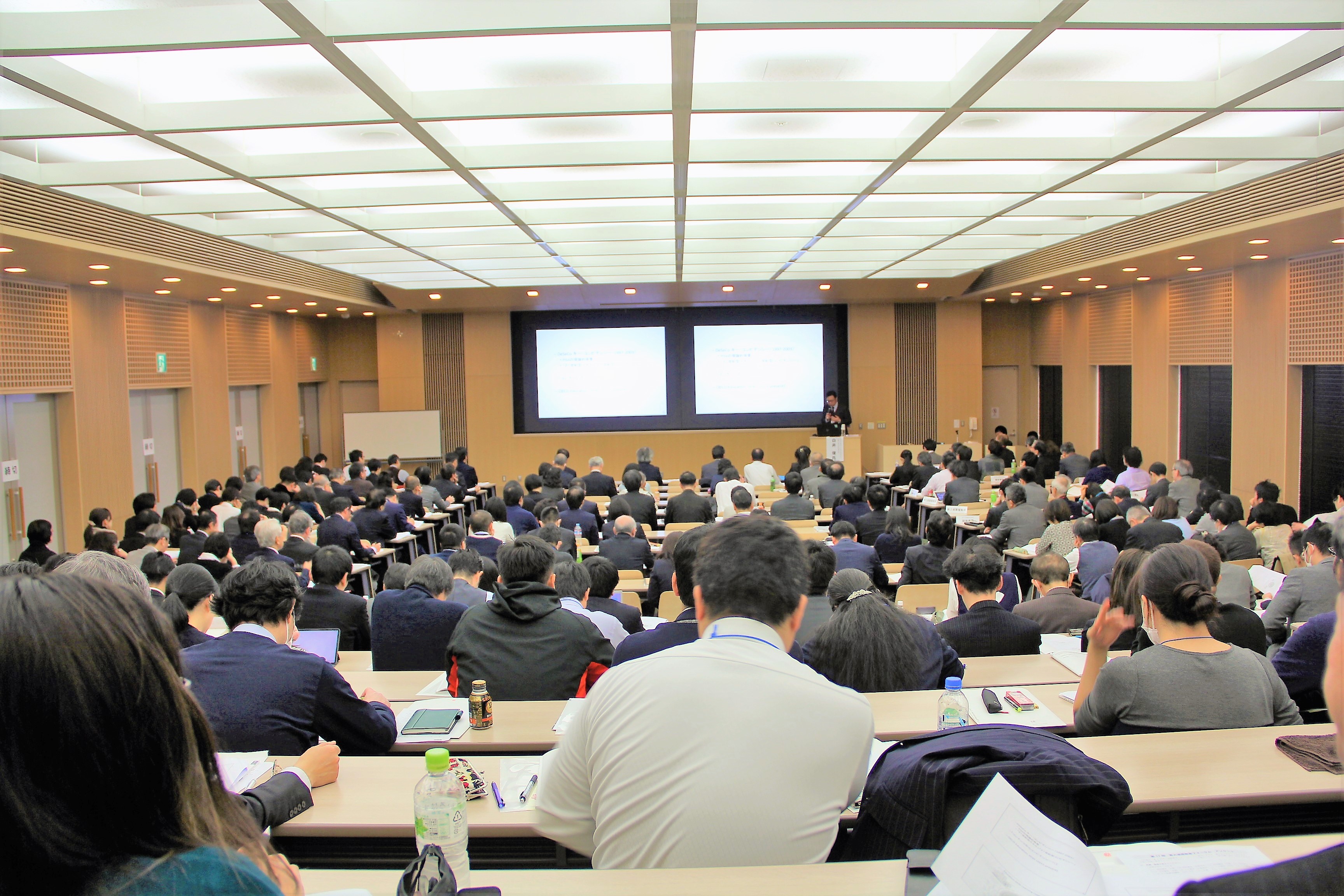
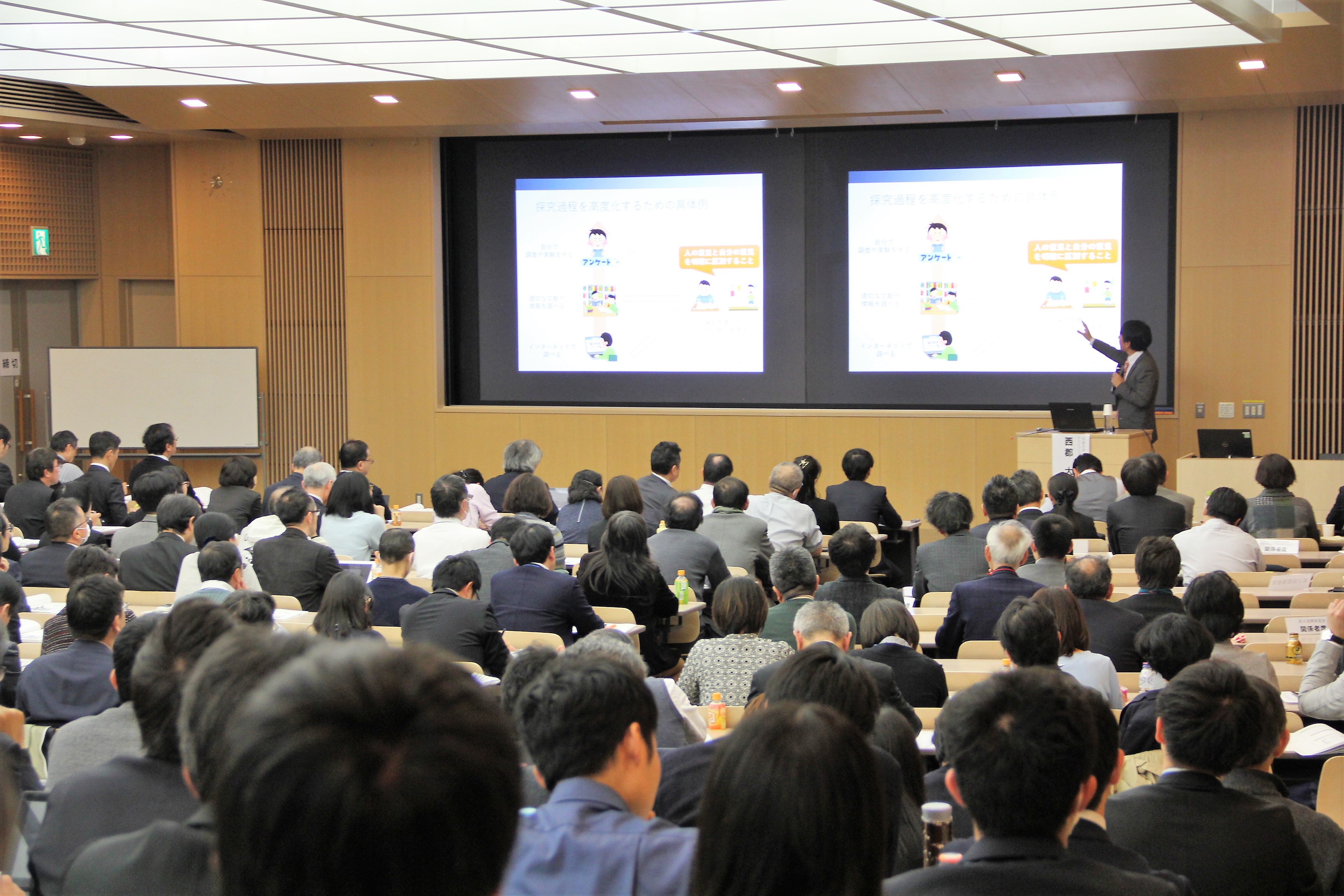
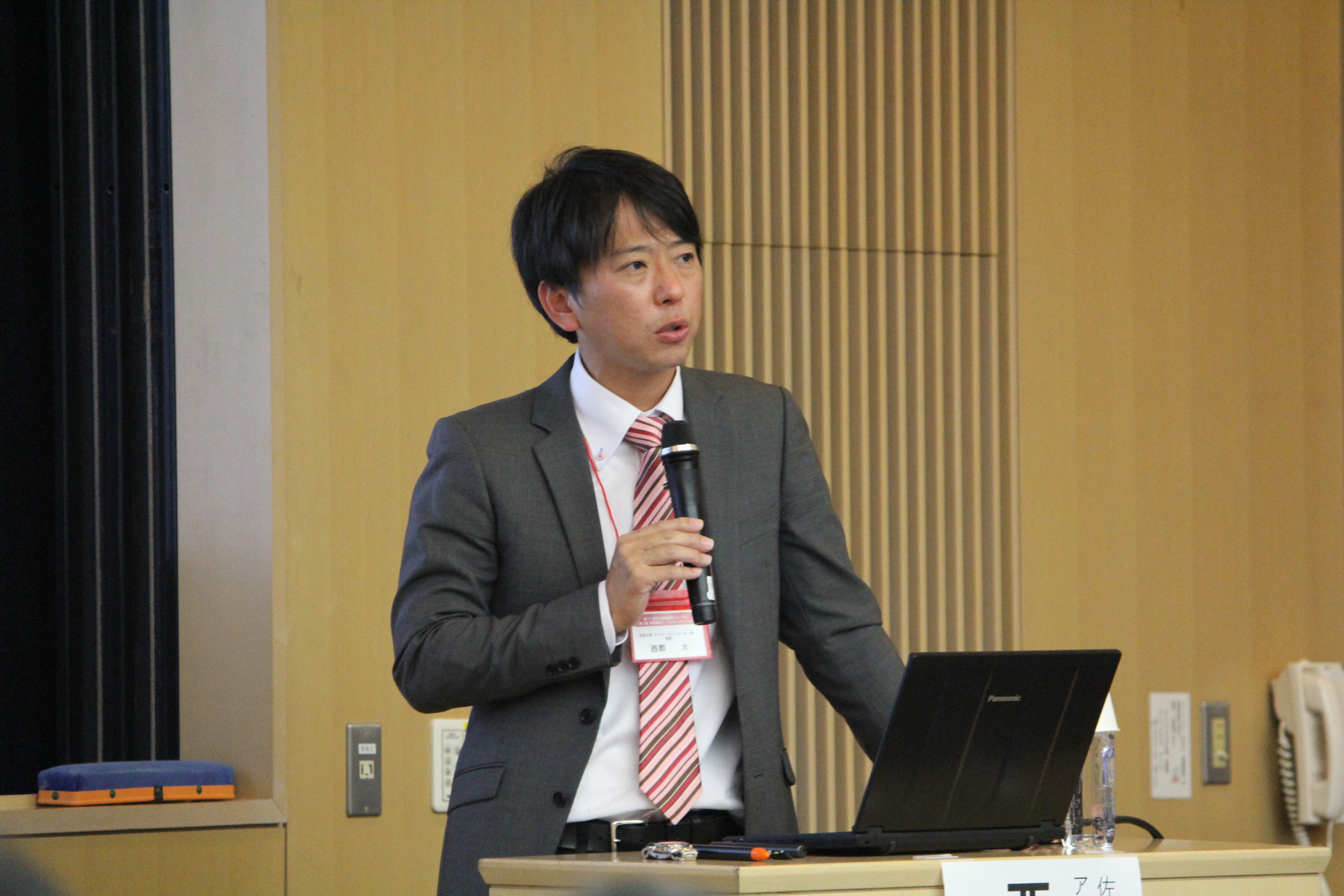
In the afternoon panel discussion, on the theme of “How should universities evaluate the development of qualities and abilities up to high school?”, Vice Principal Moriguchi Aki of Kyoto Municipal Tounan High School and Professor Onishi Toshihiro of the Faculty of Science and Technology, Ryukoku University, presented their opinions from the perspectives of high schools and universities following the two keynote speeches in the morning. Afterwards, Ms. Shirai and Professor Nishigori joined in, and with Professor Samejima Terumi, lecturer in the Department of Nursing, Faculty of Health Sciences, Kyoto Koka Women’s University, as coordinator, they discussed the comments on Keynote Speech ① and Keynote Speech ② collected from the participants.
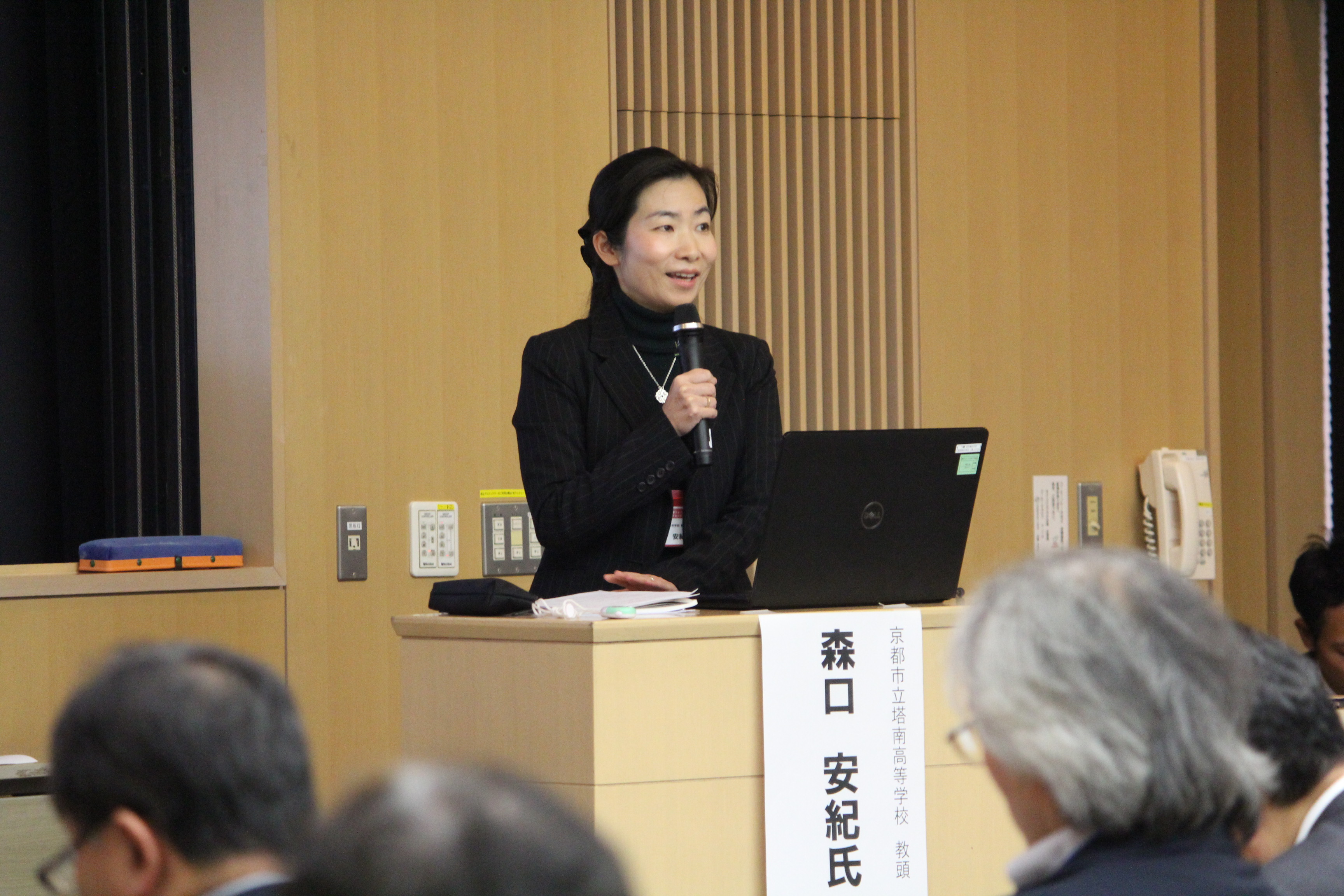
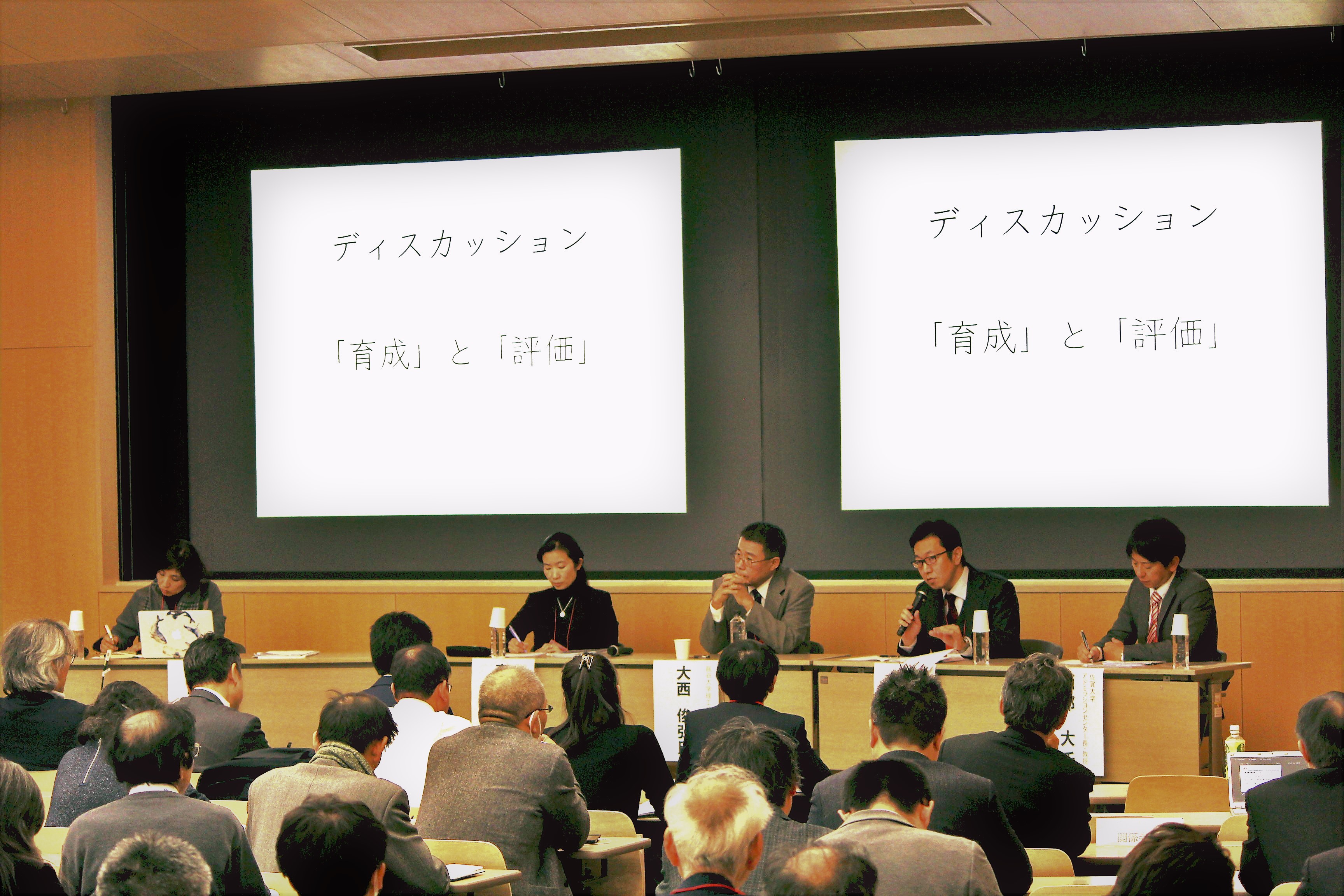
In the second part of the event, there were seven subcommittees, including the five subjects of “Japanese,” “History and Geography,” “Mathematics,” “Science,” and “English,” just like last year, as well as special subcommittees on “Admissions Professional Human Resource Development” and “High School-University-Social Collaboration Career Education.” Case studies and other information were shared and lively opinions were exchanged on each theme.
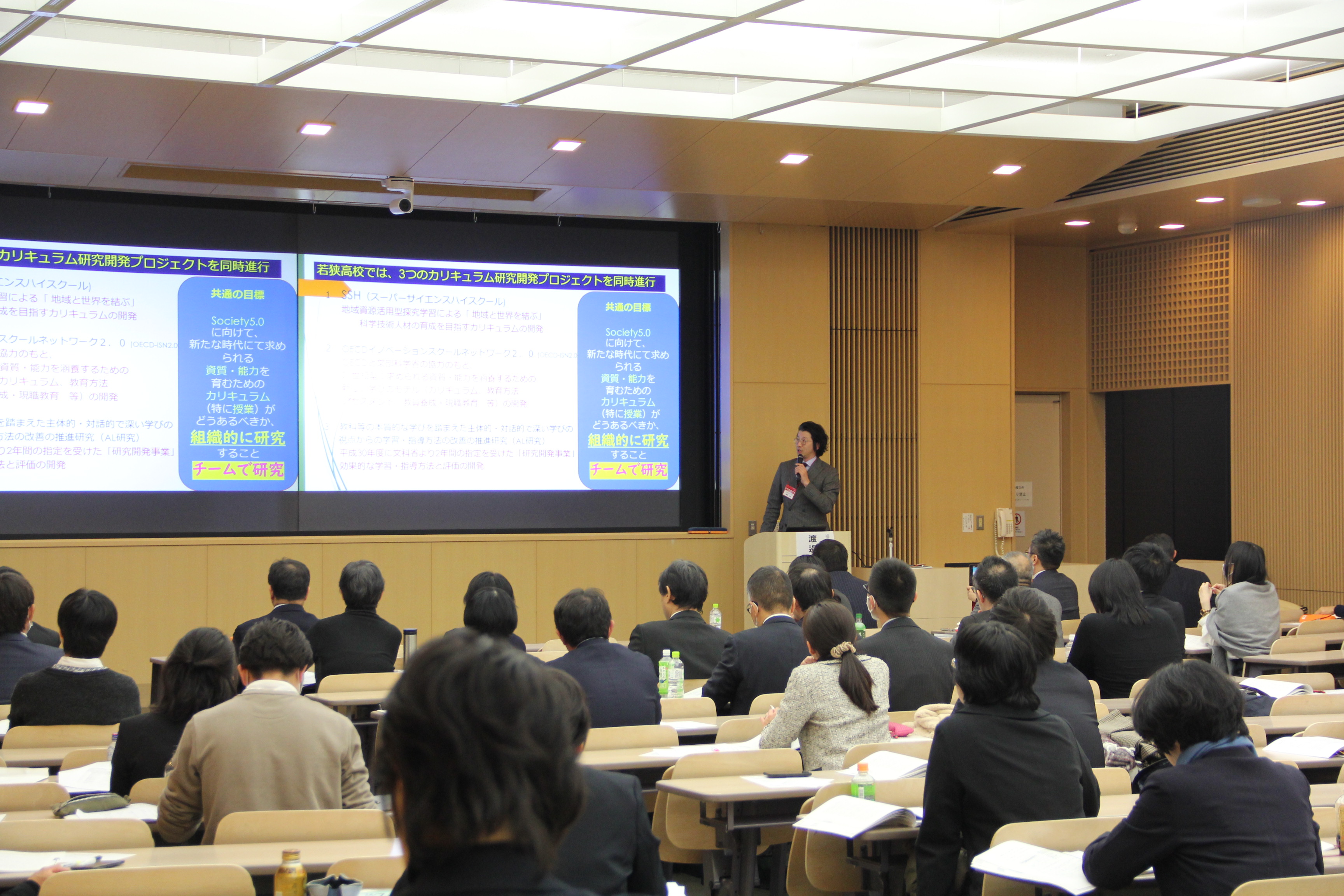
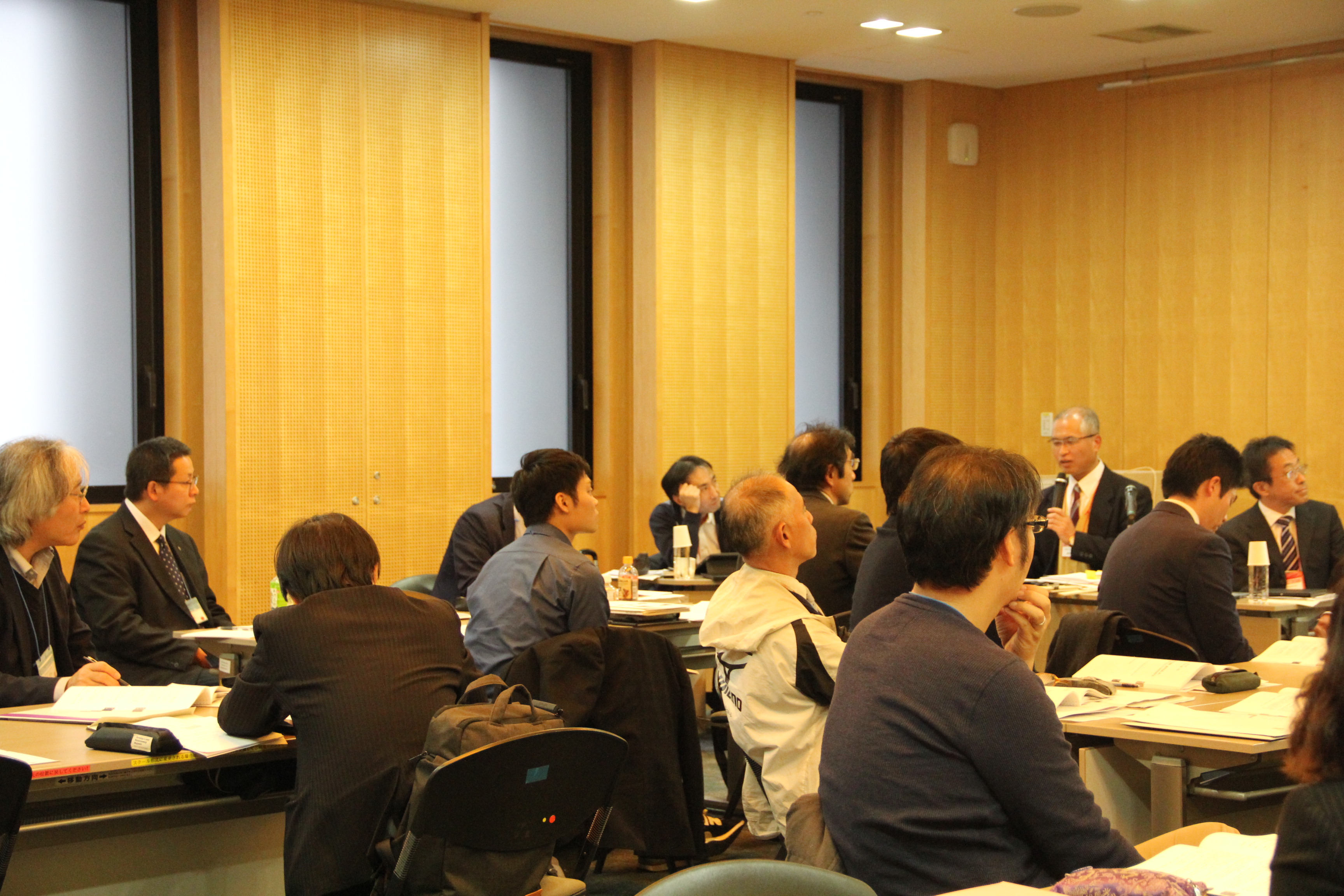
After the subcommittee session, an information exchange session was held, which was well attended and provided an opportunity for people to exchange information with the speakers and other related parties.
Contact Information
University Consortium Kyoto Forum for High School-University Collaboration Education, Public Interest Foundation
Tel: 075-353-9153 Fax: 075-353-9101 Address:
Campus Plaza Kyoto, Nishinotoin-dori Shiokoji-sagaru, Shimogyo-ku, Kyoto 600-8216
*Reception hours: Tuesday to Saturday 9:00-17:00 (excluding New Year holidays)














